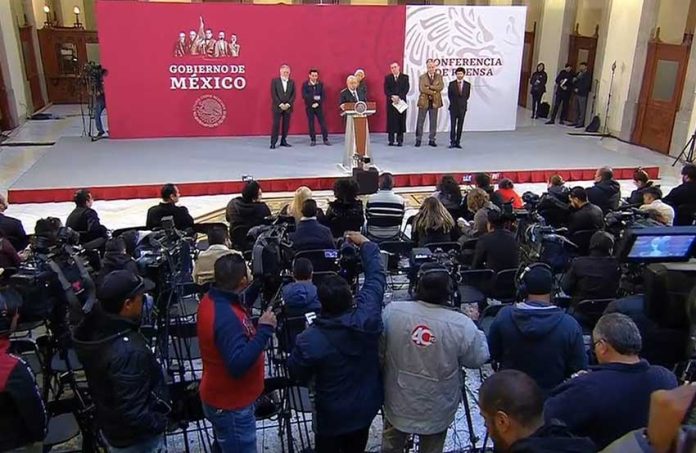President López Obrador’s weekday press conferences are one of the most popular actions implemented by the federal government, according to a recent poll published by the newspaper El Financiero.
At 7:00am daily, the president steps up to a waiting media throng at the National Palace in Mexico City to answer questions and in the process try to set the day’s political agenda.
But questions challenging the president are not well received, either by López Obrador himself or by many of those who watch, fueling a polarization that some observers find worrying.
Despite the event’s early start, as many as 50,000 people watch the presser on López Obrador’s official YouTube channel, which has almost a million subscribers.
For those watching at home, the journalists who ask the questions are a constant target, especially if they dare to challenge the president.
In the YouTube comments section and elsewhere online, they are accused of being disrespectful, receiving bribes and worse, while female reporters are subjected to gender-based criticism such as being called a “bitch” or a “slut” or shamed for not wearing make-up.
A report by the news agency Bloomberg looked at the case of a female reporter who asked López Obrador whether he was investigating nepotism in his government.
The social media backlash was swift and harsh: within minutes, posts on platforms such as Twitter labeled her a cow, a member of the Gestapo and a “lazy pig” because she didn’t stand up when she addressed the president.
The hate-filled campaign against reporters who are deemed to be out of step with the “fourth transformation” – as the president calls the change he is bringing to Mexico – appears to be widely driven by bots, Bloomberg said.
López Obrador has denied that his administration has anything to do with automated social media accounts that defend him staunchly and shoot down anyone who criticizes the government or expresses a contrarian view.
It is clear, however, that the president doesn’t enjoy being challenged by reporters, even though he frequently holds up freedom of speech and “the right to dissent” as hallmarks of his government.
While United States President Donald Trump speaks of “fake news,” López Obrador dismisses reports with which he doesn’t agree by declaring that they come from the prensa fifi (snobbish, elitist press).
The president has also called journalists and news outlets “puppets,” “hypocrites” and “two-faced.”
This week, he clashed with high-profile United States journalist Jorge Ramos, who questioned him about the government’s homicide statistics and declared that Mexico was on track to record its “bloodiest year” in “modern history.”
López Obrador rejected the claim, stating “we have controlled the situation, according to our data,” although he didn’t cite his source.
Later, security analyst Alejandro Hope wrote on Twitter that “if the president believes in the numbers he presented . . . he is deceiving himself . . . If he does not believe in them, he is trying to deceive us.”
The government’s performance on combatting crime and corruption, the decision to cancel the Mexico City airport project and a wide range of other issues have provoked fierce debate between supporters of López Obrador and those who oppose him, both on social media and beyond.
Rossana Reguillo, a social scientist at ITESO, a university in Guadalajara, said the profound split between the opposing forces is concerning.
“It’s important to see the impact of polarization on the country. It’s making it hard to have a real debate,” she said.
There are also deep concerns about antagonism towards the press – including López Obrador’s – given the very real dangers of working as a journalist in Mexico. At least three reporters have been murdered this year and Mexico is considered one of the most dangerous countries for journalists in the world.
“Unfortunately, what we’re seeing today is that the president is constantly stigmatizing the press,” said Ana Cristina Ruelas, regional director of Article 19, a freedom-of-information advocacy group. “The moment that you stigmatize the press, violence against them could be justified.”
A study by ITESO found that social media attacks on journalists have increased since López Obrador was sworn in in December, and that Twitter accounts run by bots spread his anti-media messages, ensuring that they reach a wide audience.
Asked about the ITESO study at a recent press conference, the president said, “it’s not true that there is a group encouraged by us to defend us against those who question and criticize us” before adding “we do not have bots.”
But whether aggressive online language towards the media – including threats – is endorsed by the government or not, it is still extremely concerning for journalists.
Daniel Blancas, a reporter for La Crónica who was abducted and assaulted after writing about fuel theft, said that he is now more cautious about the online threats and insults he receives, especially after asking a difficult question at a presidential press conference.
He also said that López Obrador should take more care with the language that he uses to criticize the press.
The president “should understand that the press isn’t there to hold his hand and march with him,” Blancas said. “The press is there to stand watch.”
Source: Bloomberg (sp)
